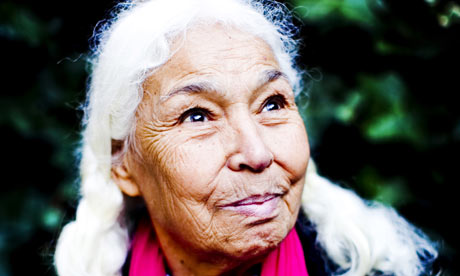Last night a woman named Anna emailed me from New Zealand, asking for "any thoughts about where you saw race and anti-racism fitting into the riot grrrl scene." Her letter reminded me that part of the reason I want to study and discuss feminist theory here, as part of Jigsaw, is because the version of feminism that exists in popular culture is watered-down and incomplete.
I am interested in transnational feminisms that address imperialism, empire, economics, war, racism, genocide and neo-colonialism as well as queer/trans issues. I'm also interested in examining the history of white, western/northern, hetero-normative, middle-class feminism, in order to figure out how to create a more radical (anti-empire, anti-capitalist, anti-racist) feminist movement. So that is part of the motivation behind this project.
The Feminist Theory Reader (FTR for short) I am reading has a similar aim. In the introduction, the editors ask:
How is women's subordination as women connected to related oppressions based on race, ethnicity, nationality, class and sexuality?
Making this a central question, they chose articles that present "multi-racial u.s. feminisms" within a global framework. By writing about "feminisms" rather than feminism, they call for a "multi-vocal feminist theory", claiming: "there can be no one theory of gender subordination or a best strategy for change".
The editors go on to say that they want to interrogate what they call "the normative women's experience" that is at the center of white, northern, middle class and/or hetero feminism. By contrasting examples of feminism w/ "the normative subject" at its center with "counter voices that trouble the privileges and exclusions within those texts", the editors aim to de-center the privileged version of feminism and offer a more inclusive, open model. If that sounds confusing, I think it will become clear as I discuss specific articles in the book. And like I said before, please read along if you like, it would be a lot better to have people to discuss this with as a conversation, rather than just rambling off on my own tangents. Ideally, this kind of work would be done in collaboration, but in the absence of a feminist theory book club I decided to just push forward and share what I'm thinking about here in journal form.
Here's part of what I wrote in my letter to Anna:
One of the reasons I wasn't super involved in riot grrl after it started (other than through Bikini Kill/ and making zines) was because I thought it was too universalizing and too focused on this supposed common identity of "being a girl" and that that somehow makes us all victims....this is hard to generalize about, but I had read Inessential Woman by Elizabeth Spelman and Gender Trouble by Judith Butler as well as Feminist Theory From Margin to Center & Ain't I a Woman by bell hooks and Women, Race and Class & Women, Culture and Politics by Angela Davis and This Bridge Called My Back and other feminist anthologies by women of color...I saw that a lot of the same problems with the second-wave were reappearing in riot grrl. But because Bikini Kill and riot grrl were under constant attack, it was hard to voice my critique. A lot of girls were coming to terms with their own sexual abuse, experiencing sexual assault and/or coming out as queer. Additionally, people were attacking us at shows and accusing us of being sexist for excluding men and we were constantly being sexually harassed, so it was not exactly a good time to be critical. The group of women who I know that were involved in riot grrl were very much in need of support and could not handle criticism.
In my own work, back then, I wrote about "being inclusive" and was vaguely calling for solidarity, but made no real, sustained attempt at making that happen. Looking back, I think my idea was that if all girls started bands and created their own media, then everyone would be represented and we'd figure it out eventually. Well...that was a little naive and Utopian....to say the least! What I learned from this, is that, because not everyone has equal access to resources and leisure time, dominant hierarchies will reproduce themselves in the underground as well as the mainstream. This is why I think the Girls Rock Camps are cool, they are actually getting girls access to skills and resources and not just telling them to "start a band", but actually really facilitating the whole process and creating an inclusive, participatory forum where girls define themselves on their own terms and have a voice.
Also, when I was younger I was really into my own scene at the expense of having a very good understanding of how things worked outside of my own personal experience. While "the personal is political" is a good slogan, in reality, when privileged people focus on personal politics and giving voice to their experience, the result is a limited, privileged version of the world. In other words, advocating for people to 'represent themselves' is not always the best strategy. White people need to address racism and be accountable, just as men need to address sexism and be accountable for how it manifests itself in their work. So live and learn I guess.
I also think it's important to remember the girls of color who were involved in riot grrl/90's punk rock feminism, such as Amy, Emily and Wendy from Emily's Sassy Lime, Mimi Nguyen from Evolution of a Race Riot (who you already mentioned), Sabrina Margarita from Bamboo Girl, Dasha Bikceem from Gunk, Phyllis Forbes from Raooul/The Tourettes, Akiko Carver, Cindy Hales... to name a few off the top of my head. I realize these are just names and maybe not that helpful, but I think it's important not to generalize that riot grrl was "white, straight, middle class"' bla bla bla, when there were a lot of queer girls involved and definitely some working class/poor girls and/or girls of color there from the beginning.
I guess it might seem weird to create this kind of a list, but at the risk of sounding tokenistic or reductionist, really it's more important not to erase this history by excluding these names off the official record of what happened. I'm thinking about how I really needed lists of feminists or women in punk in order to feel less crazy as a teen in a male-dominated punk scene. Those names would give me a sense that I was not alone and that I was not isolated in my experience, that people had come before me. I think when you are feeling marginalized or excluded that having this kind of a list can be really vital to your cultural survival as a source of legitimacy and inspiration.
I guess I'll have to think more about this in the future, as this question has come up every time I've spoken publicly on riot grrl and I'm sure it's going to always be one of the central things people are interested in talking about. It would be cool if there was some writing on this to point people towards that was not super academic and subsequently inaccessible to people outside of "the academy". Or perhaps that is something I will have to write myself, which will require further research and theoretical work.
So anyhow, I guess this letter brought up a lot of questions and reminded me of one of my central motivations here. I will use this as a space to list resources/links related to anti-racist feminisms and talk about issues/concerns that go beyond the limits of my own personal experience. This is where books can be extremely useful as learning tools.
To start with, here are two resources that I have recently come across:
Make/Shift"Make/shift magazine creates and documents contemporary feminist culture and action by publishing journalism, critical analysis, and visual and text art. Made by an editorial collective committed to antiracist, transnational, and queer perspectives, make/shift embraces the multiple and shifting identities of feminist communities. We know there’s exciting work being done in various spaces and forms by people seriously and playfully resisting and creating alternatives to systematic oppression. Make/shift exists to represent, participate in, critique, provoke, and inspire more of that good work."
and
Women of Color and Feminism by Maythee Rojas
"In this seventh installment of the Seal Studies series, author and professor Maythee Rojas offers a look at the intricate crossroads of being a woman of color. Women of Color and Feminism tackles the question of how women of color experience feminism, and how race and culture can alter this experience. Rojas explores the feminist woman of colors identity and how it relates to mainstream feminism. Through stories and profiles of historical women of color (including Josefa Loaiza, Hua Mulan, and Sahaykwisa), discussion of the arts, and a look at the feminist groups and icons of today, Rojas examines what it means to be both a woman of color and a feminist in a multicultural world. Covering a range of topics, including sexuality, gender politics, violence, stereotypes, reproductive rights, and the contrasts within race and class dimensions, Women of Color and Feminism offers a far-reaching view of this multilayered identity.
A powerful study, Women of Color and Feminism strives to rewrite race and feminism, encouraging women to “take back the body” in a world of new activism. Women of Color and Feminism encourages a broader conversation, creating a discourse of feminism within ethnic studies, and explores how women of color are bridging this gap."

Please feel free to list your own resources and links in the comments.
I will talk more about what "transnational" means as it relates to feminisms in future posts.














